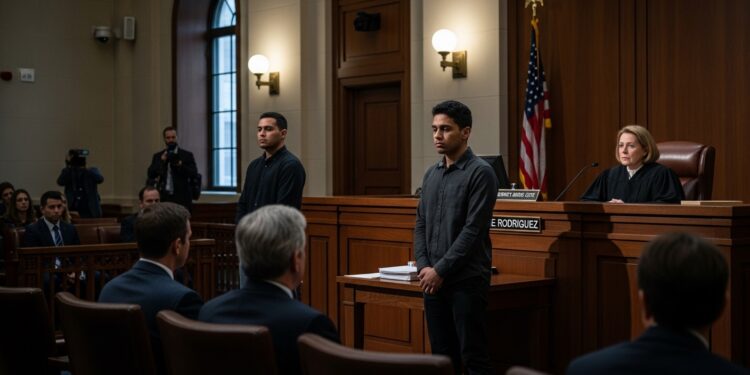A federal courthouse in downtown Manhattan saw a quiet end to a loud chapter this week. Keonne Rodriguez, a developer behind Samourai Wallet, received a five-year prison sentence. This was for his part in creating a bitcoin mixing service, a digital tool designed to obscure transaction trails.
- Keonne Rodriguez, a developer of the Samourai Wallet bitcoin mixing service, was sentenced to five years in prison for operating an unlicensed money transmitting conspiracy.
- Prosecutors argued the service facilitated over $237 million in illicit funds, while Rodriguez’s defense sought a much shorter sentence, highlighting the legal complexities surrounding privacy-focused crypto tools.
- This case, alongside the trial of Tornado Cash developer Roman Storm, underscores the ongoing legal challenges in defining the line between creating privacy tools and aiding criminal activity in the cryptocurrency space.
Prosecutors claimed this service helped clean over $237 million in illicit funds. The sentence, handed down by District Judge Denise Cote of the Southern District of New York, represents the maximum allowed for Rodriguez’s crime. It is a stark reminder of the legal tightrope walked by those building privacy-focused crypto tools.
Think of a bitcoin mixer like a digital laundry machine. You put in your coins, others put in theirs, and everyone gets different coins back. The goal is to obscure the trail of where money came from or where it went. For some, this is about financial privacy. For others, it is a way to hide illegal gains.
Judge Cote’s decision followed strong arguments from prosecutors. They had pushed for the maximum sentence, detailing the alleged uses of Samourai Wallet. Their sentencing memo, submitted in October, painted a grim picture.
Prosecutors argued that the service moved money from drug deals, darknet markets, cyber intrusions, and various frauds. They also cited murder-for-hire schemes and even a child pornography website as beneficiaries. It is a list that reads like a grim tour of the internet’s underbelly.
Rodriguez’s lawyers, on the other hand, had suggested a much shorter term. They asked the court for a sentence of one year and a day in prison. The difference in these requests highlights the vast disagreement over the developer’s culpability and the nature of the tool he created.
Rodriguez and his co-developer, William Lonergan Hill, faced arrest last April. They were initially charged with conspiracy to commit money laundering and conspiracy to operate an unlicensed money transmitting business. These are serious accusations, carrying significant prison time.
After fighting the case for more than a year, the pair struck a surprise plea deal in July. Rodriguez pleaded guilty to the lesser charge: operating an unlicensed money transmitting conspiracy. This agreement dropped the money laundering charge, which carried a maximum sentence of 20 years.
This plea came right in the middle of another big trial, that of Roman Storm. Storm helped build Tornado Cash, another popular crypto privacy tool. He faced similar charges in the same New York district, including conspiracy to violate international sanctions.
Storm’s trial saw a mixed verdict. A Manhattan jury found him guilty only on the unlicensed money transmitting charge. They could not reach a unanimous verdict on the money laundering or international sanctions charges. Prosecutors have not yet said if they will try Storm again on those undecided counts.
The outcomes in these cases draw a clearer, if sometimes harsh, line for crypto developers. When does creating a tool become aiding a crime? The courts are still figuring out these questions. Each new ruling adds another piece to the complex legal puzzle.
Operating an unlicensed money transmitting business might sound less severe than money laundering. But it is a serious charge in its own right. It means you are moving money for others without the proper licenses. Governments want to know who is moving money and why.
This helps them track funds, prevent terrorism financing, and stop tax evasion. Crypto mixers, by their very nature, make this tracking difficult. They introduce a layer of anonymity that regulators find problematic, especially when large sums are involved.
The idea of mixing funds is not new in the digital world. Early digital cash systems also faced questions about privacy and illicit use. Bitcoin’s public ledger, while transparent, still allows for some anonymity if care is taken. Mixers add a layer of obfuscation, making it harder to link transactions to individuals.
This tension between privacy and surveillance is a constant theme in crypto. Many in the community believe privacy is a fundamental right. They see tools like Samourai Wallet and Tornado Cash as essential for financial freedom, protecting users from unwanted scrutiny.
But regulators see a different picture. They focus on the potential for these tools to hide serious criminal activity. The sheer volume of alleged illicit funds, $237 million in this case, certainly grabs their attention. It is a balancing act, and the scales often tip toward public safety.
For developers, these cases create a difficult landscape. Is the creator responsible for how others use their software? The law often distinguishes between building a general-purpose tool and one specifically designed to break rules. Crypto mixers sit right in that blurry area.
William Lonergan Hill, Rodriguez’s partner, will face the same judge on Friday. His sentencing is set for 11 am ET. It will be interesting to see if his outcome mirrors Rodriguez’s, or if any new details emerge to shift the court’s view.
The crypto community watches these trials closely. They see them as tests of fundamental principles. Will privacy tools survive in their current form? Or will regulators push for more centralized control over all transactions? The answers will shape how we use digital money for years to come.

















